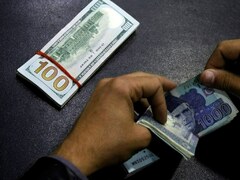As the New Year approaches, Berlin bakery worker Jessica Arendt is not just looking forward to the fireworks. In 2015, she says, "I'll be able to afford a few more things". A national minimum wage comes into effect in Germany on January 1, and that means an additional one euro ($1.30) an hour for the 23-year-old. Mathias Moebius, a bakery chain owner, isn't quite so happy. He says he will have to put up prices in response.
Chancellor Angela Merkel this year signed off on the country's first national minimum wage, an idea she had long opposed. In the past, Merkel favoured separate pay deals by industrial sector and region, arguing that a national minimum wage would harm many small- and medium-sized businesses and could force them to lay off workers.
But her coalition partners, the centre-left Social Democrats (SPD), were adamant that they would only enter into a power-sharing deal if Merkel and her conservative Christian Democrats (CDU) agreed to the fixed basic wage to help Germany's growing army of working poor. So, after long and tortuous negotiations, the two sides finally agreed to start phasing in a minimum wage from January 1. Arendt will now receive 8.50 euros per hour before tax, one of around 3.7 million people the Federal Labour Agency predicts will see a fatter pay packet.
For Moebius, whose bakery chain numbers some 45 stores in the eastern German state of Saxony, more than 300 employees will be affected. Moebius acknowledged that it would be good for his workforce in principle. "It will bring the financial remuneration for working in a personnel-intensive sector like the food industry more into line with other sectors," he told AFP.
"It may even improve the image of our industry." But for a family-run business like his, it would also mean a 10-percent rise in costs, which he would have to recoup elsewhere, he said. Economists argue that if there are price rises in other sectors, if taxis and hairdressers also put up their prices, then Arendt and the millions of other low-wage earners will soon find themselves out of pocket as quickly as before. In Berlin, Ahmet, a 58-year-old taxi driver who is paid per ride, not by the hour, also expressed concern. "I'll probably have to pay more taxes and welfare charges. So the effect on my pay will be negative rather than positive," he said. According to a poll of 6,300 businesses across all sectors by the Ifo economic think-tank, 26 percent of employers affected by the new minimum wage plan to raise their prices; 23 percent plan to curb employee bonuses; and 22 percent to cut jobs. Others plan to reduce investment or scale back employees' working hours. The effects will be felt more sharply in eastern Germany, where wages have never been able to catch up with those in the west, even a quarter of a century after unification, economists said.
But the minimum wage has many critics around the country, not just in the poorer east of Germany. "The minimum wage jeopardises thousands of jobs in Bavaria, increases labour costs and weighs on both companies and taxpayers by creating additional bureaucracy," complained Bertram Brossardt of the regional employers' federation in the wealthy southern state.
The DIHK federation of chambers of commerce calculates that 200,000 jobs could face the chop nation-wide. But the labour agency's president Frank-Juergen Weise was less alarmist. "I don't believe there will be massive job cuts," he said recently. In Saxony, Moebius said he had no immediate plans to slash jobs or shut stores. But, he warned, "I can't rule that out in future," adding that it will probably be unskilled workers who would find it more difficult to find new work. Many economists agreed, even if the large majority acknowledge that it will take years before the real economic consequences on the minimum can be fully gauged. Nevertheless, Yen, a 20-year-old who is currently paid 7.0 euros per hour for working on a food stall in a Berlin shopping mall, says it will bring her closer to her dream of one day travelling to Australia. "I'll continue to save hard," she said.
BR100
15,103
Increased By
140.9 (0.94%)
BR30
42,619
Increased By
540.8 (1.29%)
KSE100
148,196
Increased By
1704.8 (1.16%)
KSE30
45,271
Increased By
438.2 (0.98%)






















Comments
Comments are closed.